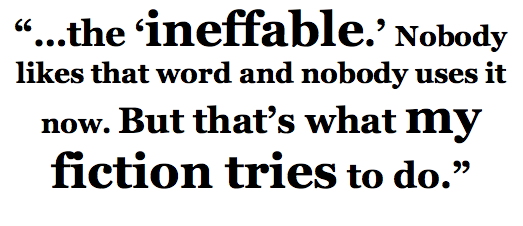
You know there used to be a word that nobody uses anymore: the “ineffable.” Nobody likes that word and nobody uses it now. But that’s what my fiction tries to do. It says, “Okay, here’s the real world, the world we live in.” But it gives off a kind of sixth sense. There’s something else that’s behind it. And to the degree that you can, when you’re writing fiction, you try to make that other world, if not visible, at least felt. And that’s what a lot of those essays are about.
SL: The fiction writer then has to possess a very keen insight that’s maybe not present with the general population?
CB: No. I wouldn’t agree. The fiction writer doesn’t have to do anything. [Laughs.] The only thing the fiction writer has to do is write fiction. He or she doesn’t have to be more sensitive than everybody else. I would just say that it’s very hard to be a fiction writer if you’re not observant, if you don’t pay attention to what people are doing, and the way they’re talking, and the way they behave.
I wouldn’t say that fiction writers have to have a spiritual agenda. I just think that if you’re going to report what it’s like to live in your own time and the way people are acting and what they’re doing and what they’re saying, it can’t all come from within. Maybe it can if you’re a poet.